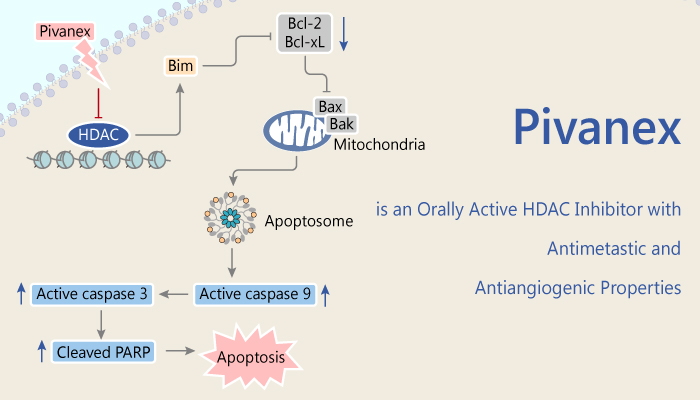Many malignancies, particularly leukemias, are associated with aberrant recruitment of histone deacetylases (HDACs) or with mutations in histone acetyltransferases such as EP300. In addition, Histone acetylation plays a key role in the regulation of transcription by modulating chromatin structure. In general, histone acetylation is relevant to the activation of transcription, whereas histone deacetylation is relevant to the repression of transcription. For example, several investigators reported that the oncoprotein promyelocytic leukemia/retinoic acid receptor-αsuppressed transcription by recruiting HDACs. Thus it interferes with normal cell growth and differentiation. Besides, there is, in fact, an increasing body of evidence that HDAC inhibitors are effective therapeutic agents for a variety of cancers that are refractory to conventional anticancer agents. Pivanex (AN-9) is an orally active HDAC inhibitor with antimetastatic and antiangiogenic properties.

Pivanex, a derivative of Butyric acid, is an orally active HDAC inhibitor with antimetastatic and antiangiogenic properties. Specifically, Pivanex down-regulates bcr-abl protein and enhances apoptosis. Moreover, the anticancer effect of Pivanex is assumed to stem primarily from the release of butyric acid, an HDAC inhibitor. Furthermore, the increased potency of Pivanex over butyric acid is most likely due to its increased permeability across cell membranes, allowing for efficient delivery of butyric acid to subcellular targets. Meanwhile, Pivanex inhibits cell proliferation and soft agar colony formation of a variety of cancer cell lines and primary human solid tumor cells. All in all, Pivanex is an orally active HDAC inhibitor with antimetastatic and antiangiogenic properties.
References:
Batova A, et al. Blood. 2002 Nov 1;100(9):3319-24.